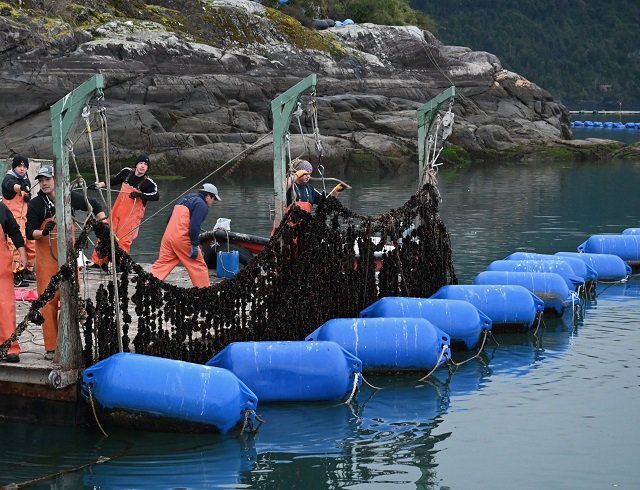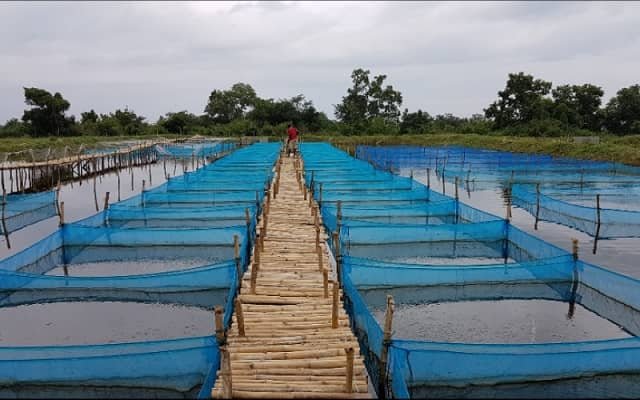
Aquaculture is a rapidly growing productive sector due to the increasing need to provide dietary protein to the global population. However, there are concerns related to its environmental impact and adverse social effects.
In this context, a group of researchers from Auburn University (USA), University of Florida (USA), University of Stavanger (Norway), University of Gothenburg (Sweden), and other academic organizations worldwide, including Dr. Carlos Chávez, an academic at the University of Talca and Associate Researcher at the Interdisciplinary Center for Aquaculture Research (INCAR), published the article titled “Environmental, economic, and social sustainability in aquaculture: the aquaculture performance indicators.” In this article, they examine aquaculture outcomes using a three-pillar sustainability framework through the analysis of data collected using the Aquaculture Performance Indicators (APIs).
Data Collection from Aquaculture Systems
Using this approach, comparable data has been collected for 57 aquaculture systems worldwide on 88 metrics that measure social, economic, or environmental outcomes. The analysis focused on two key questions:
- Are the three pillars of sustainability interconnected?
- How does sustainability performance vary among different aquaculture systems?
“First, we examined the relationships between the three pillars of sustainability and then analyzed performance in the three pillars by technology and species,” the authors explain in the document.
Finding Harmony: The Pillars of Sustainability Working Together
The good news? The study found that, on average, strong social, economic, and environmental outcomes tend to reinforce each other in global aquaculture systems. This suggests that well-managed fish farms can contribute to a thriving community, a healthy ecosystem, and a profitable industry.
“Based on this, we can say that sustainable aquaculture production is possible, and fundamental trade-offs between economic, ecological, and social sustainability should not be considered the norm, although they may exist in specific cases. However, the results also indicate significant variation in the degree of sustainability across different aquaculture systems, supporting Naylor et al.’s (2021) observation that this is a highly heterogeneous industry.”
“The heterogeneity is very interesting, and our results indicate that some important debates are probably overly simplified. This is more evident in the discussion about the relative merits and potential of freshwater versus marine aquaculture. Our results indicate that this is not a particularly interesting distinction, as the systems perform quite similarly across the three dimensions of sustainability. Rather, there are other factors that seem to be more important, such as the difference between mollusks and fish or the degree of control over the production process,” the authors explain.
However, the experts’ analysis also shows significant variation in the degree of sustainability across different aquaculture systems, and the weak performance of some production systems in certain dimensions provides opportunities for innovative policy measures and investments to further align sustainability goals.
Room for Improvement: Not All Farms Are Equal
However, the analysis also revealed significant variations. Some aquaculture systems performed poorly in certain dimensions. This highlights opportunities for specific solutions. Imagine innovative policies and investments driving production systems toward greater sustainability!
Stay Always Informed
Join our communities to instantly receive the most important news, reports, and analysis from the aquaculture industry.
“Aquaculture production systems vary widely in terms of space, production technology, species, and market. Identifying negative performance outcomes in some species and specific dimensions should not imply a rejection of this food production technology but is useful to inform public policy and investment decisions,” the authors emphasize.
The Way Forward: Innovation and Investment
These findings pave the way for a future where responsible aquaculture thrives. By identifying areas for improvement, policymakers and investors can now focus on developing innovative solutions. This could involve:
- Specific policies to incentivize sustainable practices.
- Strategic investments in research and development of environmentally friendly technologies.
By addressing sustainability challenges, the aquaculture industry can unlock its full potential to provide a safe and responsible source of food for a growing global population.
Conclusion: A Sustainable Future for Aquaculture
The research offers a ray of hope for the future of aquaculture. By understanding how the social, economic, and environmental aspects of fish farming are interconnected, we can make informed decisions. With the right support, aquaculture can become a powerful tool for ensuring food security while safeguarding our planet and its people.
The analyses are just the beginning, and the ongoing development of the Aquaculture Performance Indicators (API) database will facilitate the analysis of more detailed questions and significantly help improve the sustainability of the aquaculture sector. Expanding the database will be beneficial as it will allow for the analysis of specific subsystems and make the sample more representative of global aquaculture. For example, additional observations of seaweed would facilitate the analysis of one of the fastest-growing parts of the aquaculture sector.
Additionally, the present study adds to the growing literature on the contribution of the aquaculture industry to achieving the Sustainable Development Goals by 2030.
Funds to facilitate open access to the article were provided by the University of Stavanger & Stavanger University Hospital.
Contact
Frank Asche
School of Forest, Fisheries and Geomatics Science, University of Florida, Gainesville, FL, 32611, USA
Department of Safety, Economics and Planning, University of Stavanger, 4036, Stavanger, Norway
Email: frank.asche@ufl.edu
Reference (open access)
Garlock, T.M., Asche, F., Anderson, J.L. et al. Environmental, economic, and social sustainability in aquaculture: the aquaculture performance indicators. Nat Commun 15, 5274 (2024). https://doi.org/10.1038/s41467-024-49556-8
Editor at the digital magazine AquaHoy. He holds a degree in Aquaculture Biology from the National University of Santa (UNS) and a Master’s degree in Science and Innovation Management from the Polytechnic University of Valencia, with postgraduate diplomas in Business Innovation and Innovation Management. He possesses extensive experience in the aquaculture and fisheries sector, having led the Fisheries Innovation Unit of the National Program for Innovation in Fisheries and Aquaculture (PNIPA). He has served as a senior consultant in technology watch, an innovation project formulator and advisor, and a lecturer at UNS. He is a member of the Peruvian College of Biologists and was recognized by the World Aquaculture Society (WAS) in 2016 for his contribution to aquaculture.







